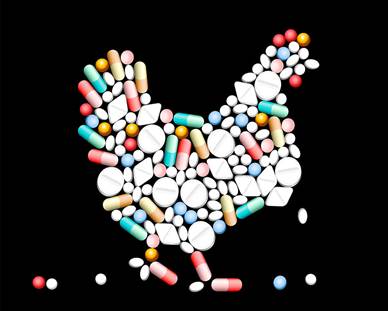- Like
- Digg
- Tumblr
- VKontakte
- Buffer
- Love This
- Odnoklassniki
- Meneame
- Blogger
- Amazon
- Yahoo Mail
- Gmail
- AOL
- Newsvine
- HackerNews
- Evernote
- MySpace
- Mail.ru
- Viadeo
- Line
- Comments
- SMS
- Viber
- Telegram
- Subscribe
- Facebook Messenger
- Kakao
- LiveJournal
- Yammer
- Edgar
- Fintel
- Mix
- Instapaper
- Copy Link
The discovery of penicillin in the 1920’s was a medical breakthrough. Who of us hasn’t relied on antibiotics to cure an infection at some point in our lives?
Yet, today in the US, 80% of antibiotics aren’t used to treat people – they’re fed to factory-farmed animals.
Why? For decades, Big Ag has been pumping these drugs into animals as a way to boost abnormally fast growth and to mitigate the spread of disease caused by filthy, overcrowded conditions on factory farms.
If these trends continue, antibiotic-resistant infections will kill 10 million people a year by 2050.
Indeed, according to a recent article in Mother Jones: “As antibiotic use skyrockets, experts expect that germs will evolve to resist them. That’s scary, considering that some of the same drugs we use on livestock are also our best defense against infections in humans. And superbugs, several recent studies have shown, can and do jump from animals to people.”
Despite the clear danger in pumping large quantities of antibiotics into farmed animals, global antibiotic consumption is predicted to grow 67% percent by 2030.
While the European Union banned the use of antibiotics for growth promotion in 2006, little action has been taken in the US. In fact, the Food and Drug Administration (FDA) has essentially given Big Ag a free pass by merely recommending “voluntary” reductions in antibiotic use.
That’s why earlier this month, US Congresswoman Louise Slaughter, who is the only microbiologist in Congress, re-introduced legislation to stop Big Ag’s overuse of these critically important drugs.
According to Rep. Slaughter: “Right now, we are allowing the greatest medical advancement of the 20th century to be frittered away, in part because it’s cheaper for factory farms to feed these critical drugs to animals rather than clean up the deplorable conditions on the farm.”
You can make a difference today: the best way to protect ourselves, public health, and animals—is to choose plant-based foods. Visit TryVeg.com to get started.

